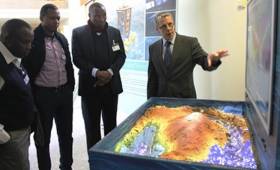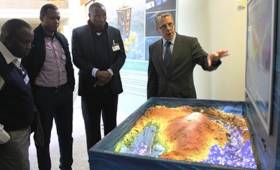Displaying items by tag: Kenya
Marine Sector MOU Signed Between Ireland & Kenya
#BlueGrowth - Ireland and Kenya have signed a Memorandum of Understanding towards co-operation of both country’s marine sectors.
The agreement was signed as part of the visit of the Minister for Foreign Affairs and Trade, Simon Coveney, to Kenya and Ethiopia last week.
The MOU between the Marine Institute and the Kenyan Marine Fisheries Research Institute (KMFRI) aims to foster increased understanding and interchange of ideas for the mutual benefit of the Irish and Kenyan marine sectors, and to establish and grow a strong working relationship between the two parties.
“We are very much looking forward to working on areas of co-operation with KMFRI in the coming years,” said Marine Institute chief executive Dr Peter Heffernan. “It is an excellent opportunity for both institutes to share expertise and knowledge.
“We are at an exciting time in terms of marine research, and agreements such as these assist with a sense of collaboration and progress, particularly on an international level.”
A delegation of officials from the Kenyan Ministry of Agriculture, Livestock, Fisheries and the Blue Economy (MALFBE) visited the Marine Institute in February 2016, as previously reported on Afloat.ie.
They were given a broad overview of the work carried out by the institute and the broad range of research vessel surveys that support its work in fisheries and coastal management.
In August 2016, the Irish Embassy in Nairobi invited Dr Paul Connolly, director of fisheries ecosystems advisory services at the Marine Institute, to visit and give a talk on the experience of Ireland with the blue economy and, in particular, the Harnessing Our Ocean Wealth process.
Following on from these and other meetings, a Memorandum of Understanding between the two institutes was proposed and was entered into last week.
Principal areas of co-operation to be pursued under the agreement will initially focus on the following areas of mutual interest:
- Marine fisheries management plans
- Hydro acoustics and assessment of pelagic fisheries resources
- Spatial analyses and mapping of vessel monitoring systems (VMS) data
- Integration of VMS and logbook data for fisheries management
- Data management best practice
- Study visits and exchange of experts
- The establishment of joint PhD and post-doctoral research projects
Minister Coveney’s visit to East Africa also included the launch of a new Kenya-Ireland agri-food strategy, meetings with Irish companies doing business in the region, and the opening of the new Irish Embassy in Nairobi.
Marine Institute Hosts Kenyan Delegation
#MarineScience - On Wednesday 17 February the Marine Institute hosted a delegation of officials from the Kenyan Ministry of Agriculture, Livestock and Fisheries.
The delegation, headed by Micheni Ntiba, Secretary General of the Ministry of Agriculture, Livestock and Fisheries, was greeted by Dr Paul Connolly, director of fisheries ecosystems advisory services, who gave an overview of the work carried out at the Marine Institute and highlighted the extensive range of research vessel surveys that support fisheries management.
Tommy Furey of INFOMAR demonstrated how we can map the seabed using the latest technology and also demonstrated the importance of topography, contouring, geology and seabed mapping with Ireland’s first augmented reality (AR) sandbox.
The AR sandbox is based on a concept first developed as part of a National Science Foundation (NSF) funded project lead by visualisation collaboration KeckCAVES at the University of California.
The Delegation toured the building to get a first-hand glimpse of the work undertaken, visiting the biotoxin lab to learn about the work involved in the biotoxin monitoring programme, and the underwater TV survey lab, viewing footage of the burrows of Dublin Bay prawn (Nephrops norvegicus), getting an insight into some of the services provided to the Irish Government.
The delegation remarked that they could see may ideas that could be used in Kenya and that they could learn a lot from the Irish experience with Harnessing Our Ocean Wealth.
Kenya is very interested in developing an integrated marine plan for their ocean resources and the delegates were very interested to hear about Ireland’s Harnessing Our Ocean Wealth strategy and how it has progressed.
There is a new acceptance in Kenya on the importance of the ocean and its potential to contribute to the Kenyan economy.
East Africa on Kitesurfing Map Thanks to Irish-born Kenyan
#KITESURFING - An Irish-born Kenyan is putting the East African country on the extreme sports map thanks to her beach resort dedicated to kitesurfing.
As the Montreal Gazette reports, Joey Kennaway - who has lived in Kenya since she was three years old - started The Kenyaway with her husband as a shack on Galu Beach, south of the coastal city of Mombasa.
But when their daughter Linzi got into kitesurfing after lessons from local tutors, the resort soon morphed into a kitesurfing village attracting daredevils from around the world.
“Kitesurfing is not for your average country-club tennis player,” says Boris Polo, owner of kitesurfing school H2O Extreme, which now has a base at The Kenyaway. “What’s hard to master is the kite. They’re very powerful."
Though she hasn't tried it herself, Joey Kennaway is happy to watch some of the thousands of all ages who've taken lessons at the resort out on the water.
The Montreal Gazette has more on the story HERE.


























































